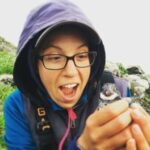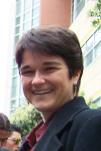Plastics and Chemicals in the Marine Environment: Effects on Seabirds in the Bering Sea and on Global Marine Ecosystems
January 25, 2017 @ 9:00am (AKST)
The toxic effects of persistent organic pollutants (POPs) and other chemicals that concentrate in plastics are a concern for ocean ecosystems. Globally, at least 44% of seabird species are known to ingest plastics because seabirds and their prey mistake plastics for food, resulting in physical harm and exposure to harmful plastic-associated chemicals such as phthalates.
On this call, Veronica Padula, graduate student at the School of Fisheries and Ocean Sciences at University of Alaska Fairbanks/Anchorage discusses her research project investigating the effects of plastic marine debris on seabird communities in the Bering Sea, particularly exposure to harmful plastic-associated compounds such as phthalates, known hormone disrupters. Christie Keith, International Coordinator at Global Alliance for Incinerator Alternatives (GAIA) talks about the science and implications of chemicals in marine plastics and GAIA’s international campaign on marine plastics.
www.breakfreefromplastic.org building a movement to stop plastic pollution for good
Global Alliance for Incinerator Alternatives GAIA is a worldwide alliance of more than 800 grassroots groups, non-governmental organizations, and individuals in over 90 countries whose ultimate vision is a just, toxic-free world without incineration. Our goal is clean production and the creation of a closed-loop, materials-efficient economy where all products are reused, repaired, or recycled.
Algalita.org Algalita envisions a marine environment that is healthy, sustainable and productive for all living creatures, free from plastic pollution.
5 Gyres.org (one of GAIA’s key partners) Our mission is to empower action against the global health crisis of plastic pollution through science, art, education, and adventure. Our vision is a planet free of plastic pollution.
Featured speakers
 Veronica Padula was born and raised in New Jersey, where she studied Ecology, Evolution and Environmental Biology at Columbia University in NYC. She became passionate about birds after interning with Wildlife Trust where she investigated the health of black-crowned night herons in New York Harbor. She later worked on a marbled murrelet project in Southeast Alaska. Veronica received her Master’s in Fisheries from the University of Alaska Fairbanks (UAF) in 2013. She is currently working on her PhD at the School of Fisheries and Ocean Sciences at UAF, investigating the impacts of plastic marine debris on seabirds from the Bering Sea.
Veronica Padula was born and raised in New Jersey, where she studied Ecology, Evolution and Environmental Biology at Columbia University in NYC. She became passionate about birds after interning with Wildlife Trust where she investigated the health of black-crowned night herons in New York Harbor. She later worked on a marbled murrelet project in Southeast Alaska. Veronica received her Master’s in Fisheries from the University of Alaska Fairbanks (UAF) in 2013. She is currently working on her PhD at the School of Fisheries and Ocean Sciences at UAF, investigating the impacts of plastic marine debris on seabirds from the Bering Sea.
 Christie Keith International Coordinator and the Executive Director of our U.S. office of Global Alliance for Incinerator Alternatives (GAIA). She joined GAIA in 2005, and has 25 years of experience with social movements and international non-profit organizations. She began her work in Guatemala as a popular educator, program coordinator, and strategic planning facilitator for groups in the women’s movement and Mayan-campesino organizing community, as well as in international human rights. For the last 15 years Christie has worked from the U.S. on international waste, public health, and environmental justice issues.
Christie Keith International Coordinator and the Executive Director of our U.S. office of Global Alliance for Incinerator Alternatives (GAIA). She joined GAIA in 2005, and has 25 years of experience with social movements and international non-profit organizations. She began her work in Guatemala as a popular educator, program coordinator, and strategic planning facilitator for groups in the women’s movement and Mayan-campesino organizing community, as well as in international human rights. For the last 15 years Christie has worked from the U.S. on international waste, public health, and environmental justice issues.
